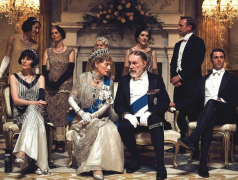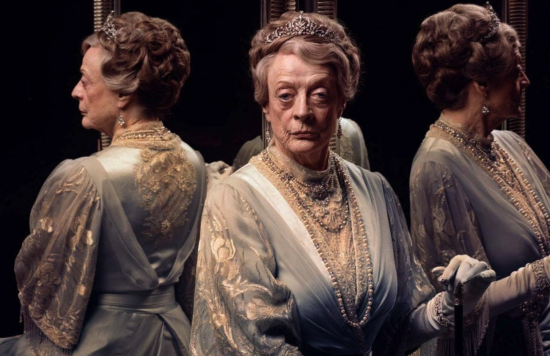Review: Downton Abbey – “Fun, silly, moving, and at times, downright pacy”
It’s a very particular kind of drug, with a diminishing supply – can you get high on aristocracy? The snobbery, manners, obsession with routine and semi-BDSM relationship with servants, are all forms of kink. Viewers have been inhaling the sweet smell of the OG 1% for years, palms sweating from the first bars of the infamous theme to the last sunset-lit frame of the Abbey itself. Worry not, the next hit has arrived.
Distilling illicit drugs into more palatable formats is natural for our times, and so Downton Abbey (the film) arrives, retaining all of the original soap opera from the much-loved TV series with additional big-screen oomph. Writer/Producer Julian Fellowes (the real power behind the throne) is back with a new story, blending the annals of history with hot gossip. However, as the majority of characters have been put through the mill and/or conveniently coupled-up during the show’s 52 episodes (downstairs is rife with workplace relationships), Fellowes has had to dig deep to conjure a legitimate plot that won’t undo his previous hard work. So, of course, he adds into the mix the one group who can look down their noses at Lord Grantham and family – Royalty.
The plot is ostensibly thus: The King (George V – QE2’s grandaddy) and Queen (Mary of Teck) of England are touring Yorkshire, and need a place to kip for the night, so they choose Downton, cue: white privilege pandemonium. Subplots ensue, and without giving anything away, larger themes are tackled, from the UK’s appalling track record on LGBTQ rights to tensions around territory and rule, topped with a light dusting of women’s lib and digs at the lowest of the low – Americans.
It is a testament to Fellowes and director Michael Engler that this film does what historical drama should do: acknowledges that it will be watched in modern times, even if the plot is 75 years’ old. This tightrope trek between conveying past fact without reveling in it at the expense of today’s audience is to be commended. Downton Abbey wants to be an ally, even if it never succeeds.

I say, do you think the writers of The Crown are watching?
All of the original cast feature, fighting it out to get their share of this tenuous plot, and Downton Abbey is a very entertaining period drama, but it is no Gosford Park. Notable additions to the cast are Imelda Staunton as the Queen’s ladies maid Lady Bagshaw, Tuppence Middleton as Bagshaw’s own maid (oh do keep up, think of them as Russian Dolls of servitude), Stephen Campbell Moore as Captain Chetwode (just wanted to type that name), Max Brown (hunky Royal butler) and David Haig (bitchy Royal butler), who all slot in nicely. Of the old guard, Allen Leech (Branson) gets a lot of screen-time, but really there is only one leading Lady at Downton. Fellowes’ masterstroke is to make Violet Crawley: The Movie, with Dame Maggie Smith’s Dowager Countess given almost too many opportunities to make snarky comments at everyone around her. She is our queen and we bow down to her put-downs.
Elsewhere, everyone else is a bit too happy, Lady Mary and Lady Edith seem to get on and Rob James-Collier’s Barrow is being nice to people! Downton Abbey delivers a good, solid hit from the patriarchy pipe, and if you aren’t into misty-eyed Kool-aid quaffing servants literally fighting each other to wait on rich people then this film is not for you.
Also, this review – unlike the movie – isn’t going to pretend that POC don’t exist, but again, this is nothing new for Downton (if you listen closely you can hear Shuri’s ‘Coloniser‘ speech from Black Panther whispered through the halls).
These glaring omissions aside, Downton Abbey is fun, silly, moving, and at times, downright pacy, who knew Michael Engler would be taking lessons from Michael Bay in terms of quick cuts and plot development! This movie simply races by, and if it does well, a sequel could quickly follow, because – to quote the Dowager – “Nothing succeeds like excess.”
Downton Abbey is in UK cinemas now.


 Buy Live for Films a coffee
Buy Live for Films a coffee







